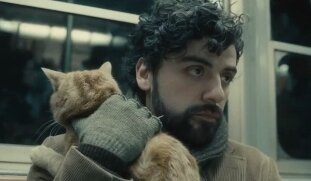|
|
| |
 |
| |
| Released: |
2013 |
| |
|
| Genre: |
MUSICAL
BLACK COMEDY
OVERRATED
COMEDY
|
| |
|
| Origin: |
US |
| |
|
| Colour: |
C |
| |
|
| Length: |
105 |
|
| |
|
| |
|
|
| |
|
|
What a pity he has no inner life.
|
Reviewed by Chris Tookey
|
At their best, the Coen Brothers do a fine line in cool, black comedy. At their worst, they go in for rambling plots which never get anywhere, a superior, patronizing tone that borders on the sadistic, and a flippancy that they and a handful of critics may find funny, but hardly anyone else does.
Inside Llewyn Davis has attracted mostly rave reviews, but strikes me as the Coen Brothers at very nearly their worst. I say “very nearly” because The Hudsucker Proxy (1994) was much slower, even less funny and a good deal more infantile.
Inside Llewyn Davis has one strength above all. It is impeccably shot by cinematographer Bruno Delbonnel. It brings to life a wintry America in 1961, lit to resemble the album cover of The Freewheelin’ Bob Dylan. It’s about the Greenwich Village folk scene, just before the advent of Dylan, whose voice in the final scene is the last nail in the leading man’s career coffin.
Llewyn Davis (Oscar Isaac, pictured) is a fictitious character, loosely based on the less than well-known Dylan forerunner Dave van Ronk. The Coens see Davis as a loser and victim, but show that most of his troubles are self-inflicted. He’s a self-centred scrounger who thinks nothing of outstaying his welcome on people’s couches and insulting their dinner guests.
When trying to find money to fund an abortion for his permanently angry ex-girlfriend (Cary Mulligan wasted on a one-dimensional role), who doesn’t know if she is carrying the foetus of Davis or her new boyfriend Jim (Justin Timberlake), Llewyn tastelessly tries to borrow the cash off Jim.
Llewyn is egregiously rude and tactless to those around him, especially women. He doesn’t even like folk music, unless it’s him singing it.
I’ve seen the film described as “sweet” and “funny”, but I found it exactly the opposite: sour and very unfunny. The hero is so churlish, so lacking in self-knowledge, so hellbent on never changing that I kept wondering why on earth he was meant to be holding our attention.
The Coens are often weak on narrative and character development, and here their plot meanders all over the place, to astonishingly little effect. This is at least in part a road movie, but an excursion to Chicago in the company of a beat poet (Garret Hedlund) and a heroin-addicted jazz musician (John Goodman) doesn’t add up to anything. Throughout, there’s a palpable sense of inertia.
All might be forgiven if Llewyn were a musical genius, but he patently isn’t. He’s a second-rate talent – an adequate singer and guitarist, but one without the spark of creativity that might enable him to succeed as a solo act. After one audition, Chicago agent F. Murray Abraham shrugs and says “I don’t see any money in it”. I didn’t, either.
The Coens deliberately leave unresolved why half of his previous double act threw himself off the George Washington bridge. By half way, you might find yourself wondering if the wrong half of the act committed suicide.
Llewyn’s cardinal sin as a leading character is not that he’s a failure – after all, Tim Burton made an excellent film about the extravagantly untalented Edward D. Wood - but that he’s a bore.
Not only that. There’s no character development and virtually no story. Shouldn’t a film with “inside” in the title probe deeply, reveal secrets, solve mysteries? Inside Llewyn Davis does none of these things.
The movie also fails to probe the extent to which the protest movement fuelled the revival of folk music in America. That’s one heck of an oversight.
Other critics have hailed this as one of the best Coen brothers’ movies. For me, it’s vastly inferior to, say, Fargo (1996), in which the brothers’ joyless, misanthropic, nihilistic tendencies were counterbalanced by a leading character of great warmth, a role which won Joel Coen’s real-life wife Frances McDormand the Oscar for Best Actress.
Inside Llewyn Davis is also far from being as original as many critics claimed it to be. It’s immensely reminiscent of Paul Mazursky’s autobiographical Next Stop, Greenwich Village (1975) about a struggling actor. The big difference is that the anti-hero of that movie had a generosity of spirit that made you wish him well.
Llewyn Davis is mean, and fatally lacks warmth or redeeming characteristics. The Coens seem to think that his attempts to be kind to a cat (which fail, naturally) make him half-way likeable, but I’m afraid they’re wrong.
For those who enjoy wallowing in melancholia, the film may deliver; but for everyone else, sitting through it is rather a chore.
|
|
|
